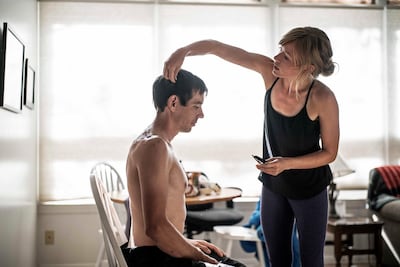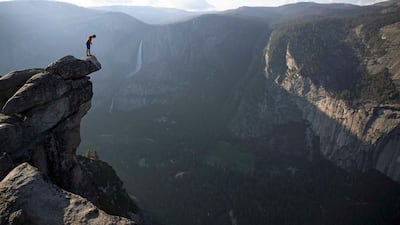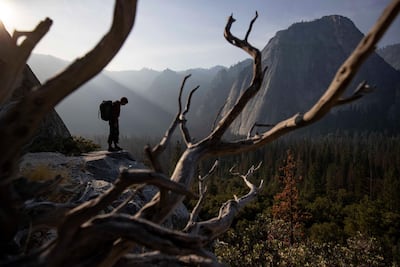* This story has been updated to note Free Solo won the Best Documentary Feature at the 91st Academy Awards on February 24, 2019
El Capitan Wall in California's Yosemite Park is a vertical rock formation that rises 900 metres into the sky, which is 25 storeys higher than the Burj Khalifa, the world's tallest building. El Cap is considered by many to be the summit of rock climbing.
The best climbers on the planet have only scaled the granite face using the most hi-tech climbing gear. To consider climbing the rock face without a rope or safety gear would be, for almost all of humankind, like going on a date with the Grim Reaper. But not for Alex Honnold, acknowledged as one of the world's best exponents of rope-less climbing, a sport that is also known as free soloing. And on June 3, 2017, he attempted to do the seemingly impossible.
To reach the summit, Honnold chose a route known as Freerider, which has 30 sections and is so difficult that it is newsworthy when a climber reaches the summit even with the assistance of ropes.
Free Solo follows Honnold over the course of two years as he prepares to climb El Capitan without safety equipment. Simultaneously, it follows a life journey of another kind, as he meets and falls in love with his partner. The film is co-directed by married couple Elizabeth Chai Vasarhelyi and Jimmy Chin, and this week received a Bafta nomination for Best Documentary.
It has since won a raft of awards including the Bafta and the Best Documentary Feature at the 91st Academy Awards.
The National Geographic and Image Nation Abu Dhabi film is reminiscent of James Marsh's brilliant 2008 documentary Man on Wire, which told the story of how tight-rope walker Philippe Petit navigated a metal wire strung between the Twin Towers of the World Trade Centre in New York in 1974. The attempt by Honnold to climb El Capitan required just as many years of planning and experience as Petit needed, and was just as courageous, daring and dangerous.
"It takes a certain type of psychopath to even contemplate doing this," Vasarhelyi says. "There's always that limit that you bump against in your head, and you ask yourself why? And I have my theories as to why. I don't try to justify them all in the film, because you can't justify why, you can only show the how."

That "how" is investigated by Vasarhelyi and Chin, who filmed the planning that went into the climb, watching on as Honnold would scale the wall using safety equipment – and working out how he would overcome El Capitan's many challenges; should he kick up his leg to reach a ledge, or jump and hold on to a couple of protruding centimetres, when the smallest miscalculation would see him fall from the precipice?
The preparation also allowed Honnold to instruct the camera crew from where he felt comfortable with them shooting. The camera team was led by Chin, with whom Vasarhelyi also made Meru, a documentary about the first ascent of the Meru Peak in the Indian Himalayas, which won the US Audience Documentary Award at the 2015 Sundance Film Festival.
"Jimmy and Alex have known each other for about 10 years, and they had been on expeditions together," Vasarhelyi says. "I'd only met Alex once socially, but when we were finishing Meru, Jimmy came home from shooting a commercial with Alex and he said that Alex is a fascinating character and what he does is incredible, scary and misunderstood."
At that point, Honnold was already fairly famous. He had been on the cover of magazines, US TV show 60 Minutes had profiled him and he had a slew of corporate sponsors.
Yet Vasarhelyi needed something more than the story of an intrepid climber taking on a new challenge to make her movie. What sold the idea to her was when Chin spoke about how Honnold needed to be rescued on a commercial shoot. "I was like, that's interesting, that means we can make a film about him, because he knows his own limits."
Vasarhelyi wanted to know what made a man capable of conquering a feat that no one in history had managed before. She reasoned that she could bring the experience of being in a relationship with someone who puts their life in danger in pursuit of their passion to the table.
This would come in handy when, at a book signing, Honnold met Sanni McCandless, and during the movie, we witness them falling in love.
McCandless's hopes and fears become the conscience of the film, as she tries to understand a man who admits to being somewhere on the autism spectrum and who is constantly staring death in the face. "The reason why we could make the film bigger than being just about him is that he has thought very deeply about his mortality and he still chooses to live this way," Vasarhelyi says. "And that asks the question: are we living our own lives the way we want?"
Meeting Honnold in London, I'm surprised that he's of average height and not of comic-book super-hero proportions. One of the things of which I had convinced myself when watching the film about his Herculean feat, looking at him stretch and eat food in the van he lived in at the park, was that he was Herculean himself. But it's his everydayness that makes the 33-year-old so endearing.
“It didn’t seem like a big deal when Chai and Jimmy approached me about making a film,” says the Sacramento-born climber. “It’s not like I’ve ever really been in a film before, so I didn’t know what it meant. I was like this sounds fun, but once we started shooting it, I realised it was more involved than I expected.”
To say it’s a dangerous sport is an understatement. Free soloing is a job that often ends with climbers falling to their deaths rather than retiring – many of them are Honnold’s friends.
"I've always been afraid of death. I've always wanted not to die," he says. "And I think that knowing people who have died in accidents doesn't make it easier or harder. You try to learn from accidents."
As for falling in love on camera, he says: “It wasn’t hard because we didn’t really know what it would mean, because we just started hanging out. We didn’t know we were signing up for a year-and-a-half of making a film together. So it doesn’t feel daunting at first, not until you suddenly realise we’ve been having a lot of heavy conversations in front of a film crew.”
Free Solo will be shown on National Geographic this March



